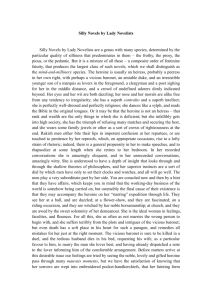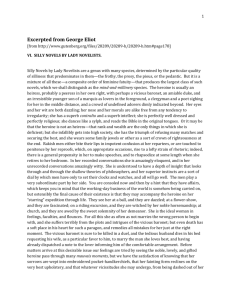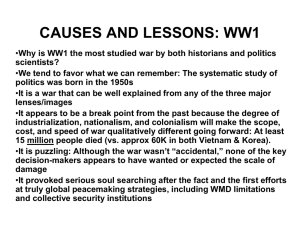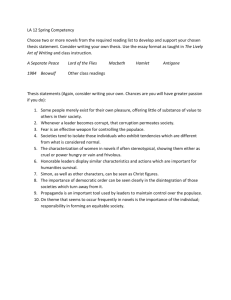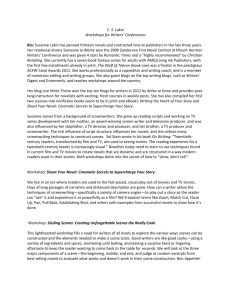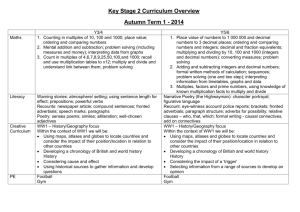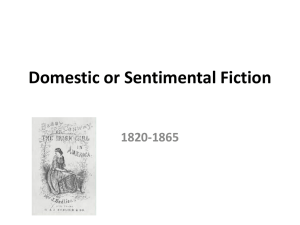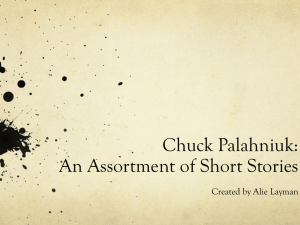WHN March 2014 writing
advertisement
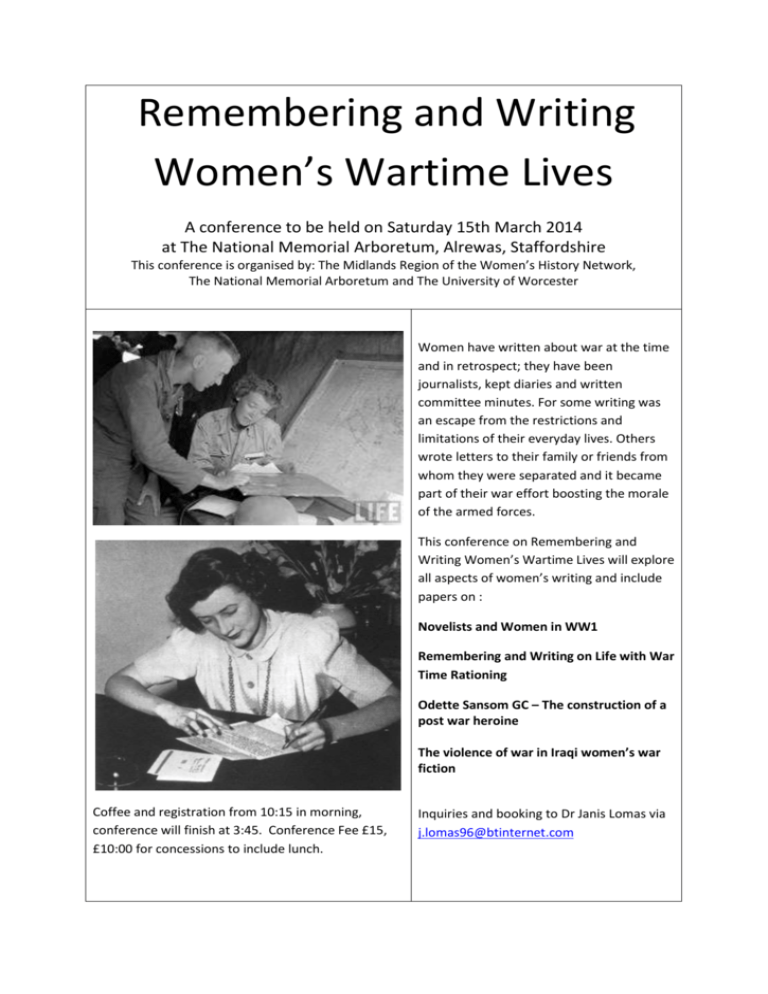
Remembering and Writing Women’s Wartime Lives A conference to be held on Saturday 15th March 2014 at The National Memorial Arboretum, Alrewas, Staffordshire This conference is organised by: The Midlands Region of the Women’s History Network, The National Memorial Arboretum and The University of Worcester Women have written about war at the time and in retrospect; they have been journalists, kept diaries and written committee minutes. For some writing was an escape from the restrictions and limitations of their everyday lives. Others wrote letters to their family or friends from whom they were separated and it became part of their war effort boosting the morale of the armed forces. This conference on Remembering and Writing Women’s Wartime Lives will explore all aspects of women’s writing and include papers on : Novelists and Women in WW1 Remembering and Writing on Life with War Time Rationing Odette Sansom GC – The construction of a post war heroine The violence of war in Iraqi women’s war fiction Coffee and registration from 10:15 in morning, conference will finish at 3:45. Conference Fee £15, £10:00 for concessions to include lunch. Inquiries and booking to Dr Janis Lomas via j.lomas96@btinternet.com Remembering and Writing Women’s Wartime Lives 10:30 Registration – coffee available in the coffee shop 11:00 Welcome 11:10 Novelists and Women in WW1; Challenging Traditional Binarisms Samantha Pilo- Gill - Brunel University Samantha.Philo-Gill@brunel.ac.uk Academic study of women and WW1 literature has taken place since the 1970s, alongside research on the intersection of gender and WW1. The focus has been on female novelists published pre-1940 and the experience of British women. Despite the variety of studies, questions remain as to whether the breadth of women’s roles in WW1 is accurately represented in fiction. This paper examines female characters in WW1 novels (published in Britain) who challenge traditional war binarisms i.e. war (male)/peace (female), by taking on war work. It specifically compares novels published pre1940 and historical (post-1940) novels; written by both female and male novelists. It considers the experience of British, French and Belgian women. The methods employed were the critical reading of forty novels, as well as data collection related to the roles of female characters and the language used to describe them. The paper concludes that there is little representation of women’s war work in the forty novels. The majority is to be found in those by female authors published pre-1940 but even then, there is certainly nothing of its broad range. A key factor is that the novels are written by the middle classes and about the middle classes. It was working class women who took on war work traditionally seen as male. Although historical novels are often used to re-imagine the role of women, WW1 is an exception. Key factors here include the perpetuation of stereotype i.e. the male soldier in a trench and the female nurse, as well as nervousness around detracting from the horrific experiences of the male soldier. Challenges to binarisms in subsequent wars (e.g. women in the armed services) have not stimulated a re-visioning in British culture, including novels, of women’s roles in WW1. 11:50 Dear Lois : histories of war from a Staffordshire letter writer Elizabeth Walker – Independent Scholar erwalker77@aol.com During the First World War, Lois Turner, like many domestically focussed women, contributed to the war-effort with a range of what may seem to be unspectacular activities including: helping out at a soldier’s Christmas Party and writing letters to a number of young men who had enlisted in the armed forces. The letters she received from her correspondents are now deposited at the Staffordshire Record Office. Using these letters, this talk will suggest that wartime letters are an invaluable source to increase our understanding of everyday life during wartime. 12:05 ‘So we both took the car out-the first time since 28th June. Anything to get a legitimate run in the car these days’: Remembering and Writing on Life with War Time Rationing Elspeth King University of Worcester elsh.king@btinternet.com Popular myths and memories have presented the Second World War as a ‘The People’s War’ suggesting a cohesive nation united in common sacrifices for a single purpose: defeating the enemy. The instigation of rationing in 1940 was a pivotal governmental tactic to ensure that all the civilian population would have access to the basic necessities at a reasonable price. Contemporary official rhetoric suggested that it led to social and moral solidarity and equality of sacrifice; Mass Observation diaries, autobiographies and memories suggest a more complex picture. This paper will draw upon range of writing to suggest that particularly in seeking to enjoy more than the basic necessities women utilised their creativity, resourcefulness and innovation to circumnavigate constraints caused by rationing of food, clothing, furniture and petrol. Thus popular narratives of women unable to get stockings using gravy browning on their legs are, are it will be suggested, only one of a multitude of practices which pre-occupied women’s everyday life on the Second World War Home Front. 12:45 -2:00 Lunch and chance to look around the National Memorial Arboretum 2:00 Odette Sansom GC – The construction of a post war heroine Dr Kate Vigurs University of Leeds E.K.Vigurs@leeds.ac.uk Immediately after the Second World War numerous books were produced about the Special Operations Executive - stories of love, heroism, and previously unimagined tortures were recounted to an awe struck public. This paper will examine one of these books - Odette by Jerrard Tickell (1949) and will aim to look for the truth within its pages. In Odette the reader finds a heady cocktail of populist subjects: glamorous heroine, Nazis, capture, betrayal, torture and concentration camps; making it immediately appealing and capturing the imagination of the reader. These elements are so prevalent and integral to the story that they are even visually realised on the front covers to different editions of the book. This paper will explore how these combined elements gave scope for myths, self-construction and self- publication. How Odette herself was aware of the public’s fascination with her, and that the over- dramatized, romanticised story told in Odette fuelled their appetite for her story even more. Did the public did not care that her story whether or not her story was accurately told, as indeed they had no way of knowing? What did she come to represent to the public? Was she something intriguing and exotic – a mother who had been tortured and imprisoned in a concentration camp but who had survived - a heroine constructed for a drab postwar Britain? Or did she really engage in this publicity campaign not for herself but for her fallen comrades to make sure they were never forgotten. Ironically in doing so her story dominated that of others and ‘Odette G.C’ has become an integral part of British cultural memory. 2:40 The violence of war in Iraqi women’s war fiction Angham Abdullah University of York aa658@york.ac.uk This paper focuses on contemporary Iraqi women’s war fiction. I investigate work by Iraqi women novelists written during three decades of wars: the Iran–Iraq War (1980-1988) which is regarded as the 20th century’s longest conventional war, the First Gulf War (1990-1991) and the subsequent 13year sanctions on Iraq, and the US-led invasion and occupation of Iraq in 2003. These three wars brought about a series of human tragedies which traumatized those who survived the atrocities and became witnesses to the wars. I examine the ways in which Iraqi women novelists testify to the tragedy of war and address trauma in their works through their depiction of survivors. I also focus on the role narration plays in articulating history. In my paper I argue that contemporary Iraqi women’s fiction of the three periods of war is inseparable from its surrounding conditions and the complexities generated by these continuous wars. In each period a new challenge was faced by people in general and women in particular in a way that is reflected in the writings of each particular stage of war. I argue that these texts portray an image of Iraqi men as doomed to fight at the war front for decades, and of Iraqi women as destined to fight at the home front. The women in these narratives are portrayed as undergoing endless victimization by a patriarchal society and by war. Yet, they prove to be capable of coping with both agonies. Moreover, the rise of new extremist groups at the aftermath of 2003 opened the door for a more restricted view of women’s freedom of thought and movement in a way that had a bad impact on women writers themselves. However, the stories of survival they provide imply the hope for a possible survival of Baghdad. -------------------------------------------------------------------------------- BOOKING FORM For further details, please contact: Dr Janis Lomas or Professor Maggie Andrews j.lomas96@btinternet.com or maggie.andrews@worc.ac.uk To book: Please either return the form to the address below with a cheque made out to ‘Women’s History Network Midlands Region’ or email j.lomas96@btinternet.com by 10 March 2014. Address: 1, Exeter road, Cannock WS11 1QE. Name Address E-mail address Please tick if applicable and students please provide details of course and institution that you are attending. Concession Student
